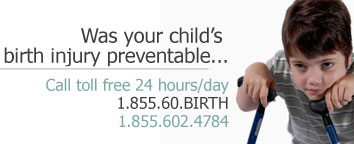When Medical Negligence Results in Cerebral Palsy
Cerebral palsy refers to a group of disorders resulting from by brain damage or abnormal brain development that can cause impaired motor skills and other disabilities. Symptoms of cerebral palsy include involuntary movements (jerking or writhing), tremors, partial paralysis, muscle weakness, lack of coordination, floppy muscles, and difficulty in walking. In some cases, cerebral palsy is a congenital condition, meaning… Read more »
Shoulder Dystocia Birth Injury: What Are the Consequences?
Shoulder dystocia takes place when the shoulder of a fetus gets lodged between the mother’s pelvic bone. When a physician attempts to dislodge the fetus’ arm from the mother’s pelvis, a number of birth injuries can take place that can seriously harm the fetus. Experts believe that shoulder dystocia occurs in 25 to 50 percent of births–a quarter to a… Read more »
Cerebral Palsy
Many children suffer from cerebral palsy resulting from a birth injury. The term cerebral palsy (or CP) is an umbrella term used to refer to a number of neurological disorders characterized by brain injury or abnormal brain development that causes impaired muscle coordination and body movement. Different kinds of cerebral palsy There are several different types of cerebral palsy, including… Read more »
$30 Million Birth Injury Lawsuit Charges Negligence
Kassie and Higinio Rivera, both residents of Michigan, filed a birth injury lawsuit on April 13, 2012. The Riveras allege that their minor child, H.R., suffered injuries after medical staff from Darnall Army Medical Center exhibited negligence during his birth. The complaint states that, among other allegations, medical staff administered Pitocin when H.R. was showing signs of distress, and is… Read more »
Birth Injuries a Serious Risk of Fetal Distress
Fetal distress is a blanket term used by medical professionals to describe a number of different birth complications, such as hypoxia, prolonged labor, diabetes in the mother or shoulder dystocia (which occurs when the infant’s shoulder gets stuck behind the mother’s pelvis). It is characterized by a change in the fetus’s heart rate, and usually occurs during delivery. Fetal distress… Read more »







